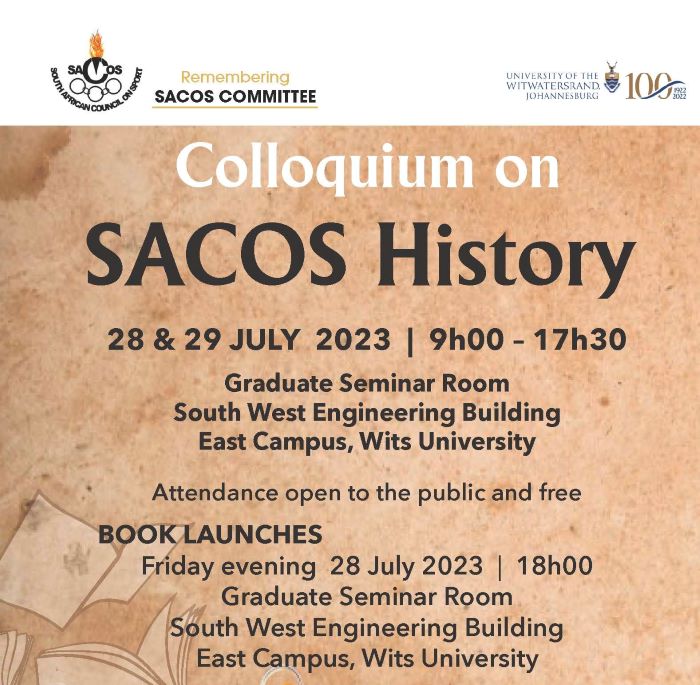Colloquium - The South African Council on Sport @50
| When: | Friday, 28 July 2023 - Saturday, 29 July 2023 |
| Where: | South West Engineering Building |
| Start time: | 9:00 |
| Enquiries: | Laurence Stewart at laurse96@gmail.com
|
| Cost: | Free |
A colloquium celebrating the 50th anniversary of the founding of SACOS, which played an important role in establishing non-racial sport in South Africa.
Hosted by the Wits History Workshop and the friends of SACOS, the two-day colloquium aims to highlight new and existing research and publications, and hopefully inspire further work to be undertaken on this neglected history. View the programme.
SACOS was launched in March 1973 at the height of apartheid but also as new liberation movements were beginning to emerge, especially among black students and workers. It became the undisputed sports wing of the liberation movement, mobilizing communities across the country behind its rallying slogan: No Normal Sport in an Abnormal Society!.
With a principled commitment to non-racialism, it actively mobilized for the exclusion of white sport from international sporting bodies, which was a central plank in the international campaign to boycott apartheid. Locally, SACOS was instrumental in exposing the fallacy of multi-racial sport by staunchly opposing the Nationalist Party’s efforts to create the impression of normal sport in the country, even as millions of black people were rising up against the racist system.
Equally important was SACOS’ role in building grassroots sports across the country. At its height in the 1980s, more than a million people participated in numerous sports codes under its banner, from primary and high schools to communities in urban and rural areas. Behind this success was a multitude of volunteers, often women, who ensured the regular organization of sports in poorly-resourced schools and communities. The extent of grassroots sports in this period was unprecedented and remarkable, especially considering the socio-political challenges faced by the black majority.
Despite these achievements, SACOS was rendered marginal at the dawn of democracy. The speed at which the unification of sport was undertaken during the negotiations process and as constitutive of the rainbow nation project, as well as the growing emphasis on elite and professional sport left little room for the ethos and practices that defined SACOS. Three decades later sports in poor schools and communities are almost non-existent.
Although SACOS played a prominent role in the liberation struggle, there remains a dearth of research and publications on the non-racial sports movement. Fortunately, over the past few years some former SACOS members have published books on aspects of non-racial sport, adding to a small but impressive collection of critical histories of sport by academics. Clearly, much more needs to be done to do justice to the rich history of SACOS.

 Add event to calendar
Add event to calendar

